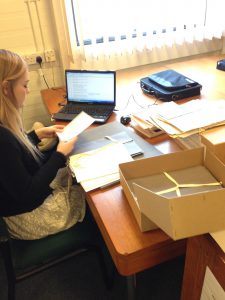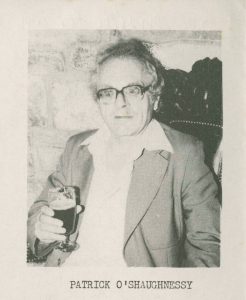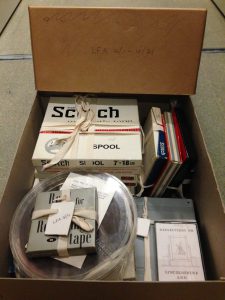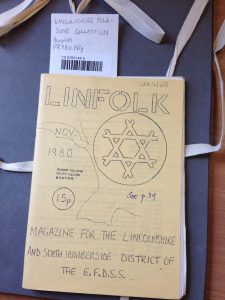November 10, 2016, by Sarah Colborne
The Sound of Lincolnshire Folk Song
The Lincolnshire Folk Song Collection was established in the early 1960s at Pilgrim College, Boston, Lincolnshire, and was transferred to Manuscripts and Special Collections in the 1990s. It has recently been given a new lease of life with the help of a student on a placement with us from the Department of Music, Lydia May.

Music student Lydia May working on arranging and listing the collection. Her knowledge of music notation gave us a much better understanding of the significance and purpose of some of the papers in the collection. Lydia was particularly interested in O’Shaugnessy’s attempted correspondence with Benjamin Brittain, and was impressed by the amount of work involved in editing the publications of songs.
Until recently the collection was described as the Lincolnshire Folk Archive but closer investigation by Lydia of the music scores and papers confirmed that it more accurately represents a collection of research material relating to English folk music in general, and Lincolnshire folk song and the work of Percy Grainger (1882-1961) in particular.
The material was collected at Pilgrim College, Boston, Lincolnshire (once an outpost of the Adult Education Department at the University of Nottingham) and Patrick O’Shaughnessy, a former tutor at Pilgrim College, was central to the collection’s development and publicity. Its current arrangement represents the activities of O’Shaughnessy in researching his own articles and published editions of collections of Lincolnshire folk songs.

Patrick O’Shaughnessy (died 2013), a former school teacher, writer, and tutor at Pilgrim College, researched traditional Lincolnshire folk songs in order to compile useful annotations for his publications which include ‘Yellowbelly ballads’ and ‘Late leaves from Lincolnshire’.
The Lincolnshire Folk Song archive is built upon copies of the early recording activities of Percy Grainger (1882-1961). Percy Grainger was born in Melbourne, Australia and studied in Frankfurt before becoming a successful concert pianist in England at the start of the 20th century. In the years 1905-1908, Grainger meticulously studied folk songs, making precise notes about dialect, rhythm, and accentuation. From 1906, he recorded many of these songs using an Edison-Bell phonograph, becoming the first folk song collector to use mechanical recording apparatus.

The collection includes a number of copies of recordings made by Grainger and other collectors, and although the songs live on in local culture, the copies themselves are in danger as they are recorded on largely obsolete formats for which we unfortunately do not have the necessary equipment.
The collection also contains some ephemera relating to Grainger’s performances, photographs of his family and associates, and reviews of books about Grainger, which provide biographical information about his work and his personal life (including his passion for self-flagellation!). Also present are a number of sound recordings in weird and wonderful analogue formats include radio broadcasts, folk songs, and interviews recorded on reel to reel magnetic tape in the 1960s-1970s.
The published material found in the collection, including monographs, pamphlets and articles in magazines such as This Lincolnshire, Lincolnshire Life, Music and Musicians, Gramophone, English Dance & Song and others, and 30 LPs, have been listed in the University’s Library Catalogue as a separate Special Collection. Researchers are welcome to come and listen to the vinyl records in our reading room (using headphones and with advanced notice so that we have time to get out and dust off our record player!).
To make an appointment, please contact us. More information about our collections is on our website. For general information, read our newsletter Discover, or follow us @mssUniNott.

‘Linfolk’, one of the publications in the newly created Lincolnshire Folk Song Special Collection of published materials

Boston Preservation Trust now manages Fydell House, Boston, as well as owning it and we understand that the University of Nottingham Extra Mural Department opened Pilgrim College there in 1945, but are we correct in thinking that Pilgrim College ended in 2003 when the University left its base in Boston? I am an ex Tutor in Politics for the U of N & the WEA. For most of my time there I work for that fine exemplar of Adult Education, Warden, the late Alan Champion.
We require this information with some urgency as we wish to have a Blue Plaque at Fydell House.
Thank you,
Peter Dorr, Trustee & Director